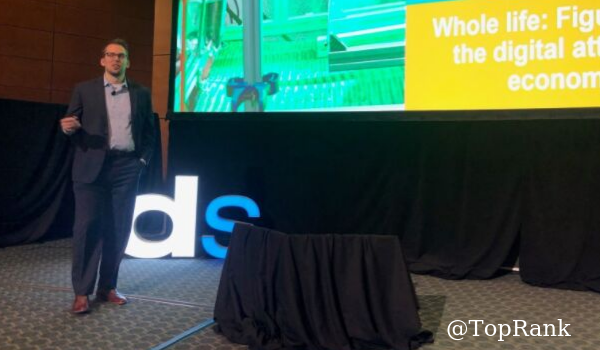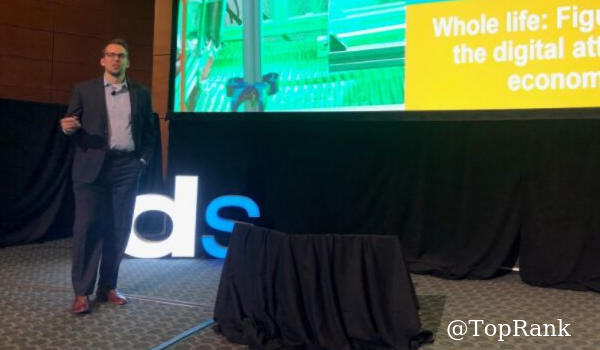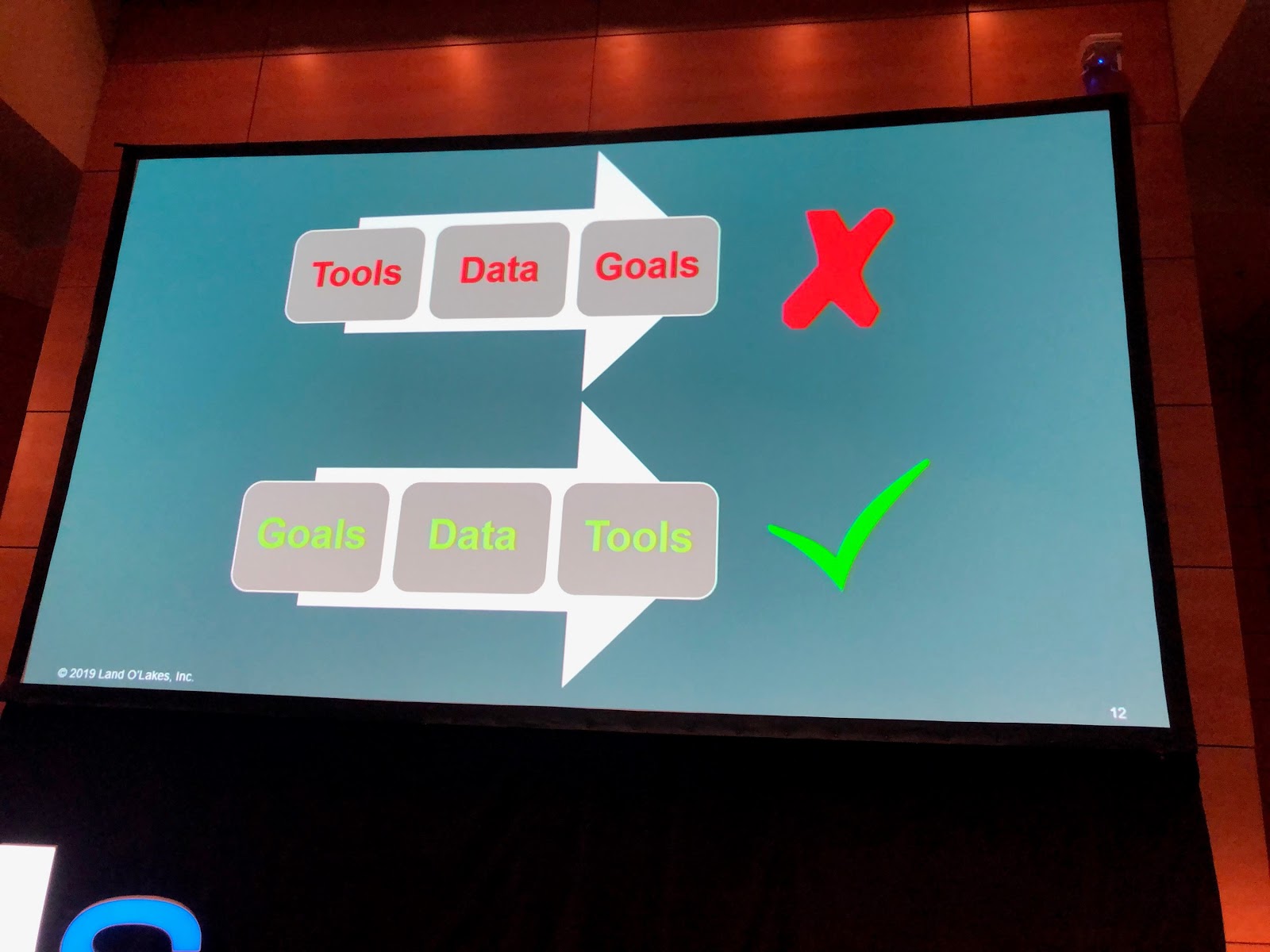
 Marketing measurement. It’s absolutely essential, but perhaps one of the hardest marketing disciplines to master. Why? As Joseph Lindberg, Digital Communications Editor for Land O’Lakes, Inc., told a room of marketers at Digital Summit Minneapolis this week: “Measurement is a loaded term. It means many things to many people.” It’s true. Measurement can be thought of in terms of KPIs. Measurement can be raw data or data insights. Measurement can be your stack of tools. And during his session, titled Building a Marketing Dashboarding Discipline: It’s Not About the Tool (Until It Is), Joseph challenged marketers to flip our thinking on how we measure. Below we outline his recommended process and advice for how you can level up your measurement game, and map tactics to business objectives so you can prove value up the ladder.
Marketing measurement. It’s absolutely essential, but perhaps one of the hardest marketing disciplines to master. Why? As Joseph Lindberg, Digital Communications Editor for Land O’Lakes, Inc., told a room of marketers at Digital Summit Minneapolis this week: “Measurement is a loaded term. It means many things to many people.” It’s true. Measurement can be thought of in terms of KPIs. Measurement can be raw data or data insights. Measurement can be your stack of tools. And during his session, titled Building a Marketing Dashboarding Discipline: It’s Not About the Tool (Until It Is), Joseph challenged marketers to flip our thinking on how we measure. Below we outline his recommended process and advice for how you can level up your measurement game, and map tactics to business objectives so you can prove value up the ladder.
See Your Challenges as Opportunities
Joseph opened up his presentation with a recent challenge his team was handed earlier this year: South by Southwest (SXSW). The first year they attended, marketing expectations were tempered—the novelty of an agriculture company attending was enough. But year two was a different story. They had a complicated, nuanced message to share with a skeptical audience—and less than 15 business days from when they received their KPIs from management to when the activation needed to be executed. Joseph suggested using a challenge like this as a tool. “You don’t have to change the entire system. But if you can start a little internal disruption, start thinking about KPIs differently, you’ll get a whole lot further,” he shared. [bctt tweet="You don’t have to change the entire system. But if you can start a little internal disruption, start thinking about KPIs differently, you’ll get a whole lot further. @JosephLindberg #DSMPLS" username="toprank"]Have Difficult Conversations
Like many marketers, the KPI list from management spanned several pages, with every little metric from pageviews to CTR. What do you do with that? Try to take on them all? Joseph said “No.” Joseph’s team used the urgency and importance of SXSW to drive deep conversations around the goals at the campaign onset. He explained, “We started with the biggest, messiest questions. We got to have conversations that I don’t think the organization had ever had before.” But he said don’t get way into the clouds of business objectives driving tactics. The goals need to help you achieve the business objectives. And, your tactics should be selected after you have goals. The output of these challenging conversations were the true measurement needs: Make vanity metrics accessible to leadership and access the right data needed to optimize content and spending in real-time. Now, they could make the right dashboard a reality.Appreciate your Foundation and Replicate
“We discovered the dashboard was one of the most valuable outputs of SXSW,” Joseph asserted. The challenge, subsequent difficult conversations, and dashboard output was now a brilliant foundation for future program measurement. Sure, each marketing program will require its own set of goals, KPIs, and metrics resulting in a slightly different dashboard. But the infrastructure was now in place. The team was now comfortable having difficult conversations—even on a time crunch. And, knew how to translate their goals into KPIs and iterate on existing dashboards.Making Your Measurement Vision a Reality
His advice for marketers for marketers to help turn their measurement vision into a reality? 1. Move the dashboard conversation around. Start with your goals. Use them to inform your data needs. Then, put tools in place to collect the data you need to measure success. 2. Develop a holistic measurement process. Make sure it works for your team so you can set your own foundation. This is something our own Tiffani Allen, Associate Director of Search and Analytics, recently covered in a post on creating an actionable marketing dashboard. 3. Leverage the right allies. When iterating on your dashboards, it can be easy to get discouraged. But the trick is to surround yourself with people who are incredibly enthusiastic. They will help drive the appetite to make things better. For the latest and greatest digital marketing knowledge, keep your eyes peeled here for updates from Digital Summit Minneapolis (#DSMPLS). For real-time insights, follow @annieleuman, @azeckman, @dfriez, and @ElizabethW1057 on Twitter.
2. Develop a holistic measurement process. Make sure it works for your team so you can set your own foundation. This is something our own Tiffani Allen, Associate Director of Search and Analytics, recently covered in a post on creating an actionable marketing dashboard. 3. Leverage the right allies. When iterating on your dashboards, it can be easy to get discouraged. But the trick is to surround yourself with people who are incredibly enthusiastic. They will help drive the appetite to make things better. For the latest and greatest digital marketing knowledge, keep your eyes peeled here for updates from Digital Summit Minneapolis (#DSMPLS). For real-time insights, follow @annieleuman, @azeckman, @dfriez, and @ElizabethW1057 on Twitter.
The post Joseph Lindberg of Land O’Lakes Outlines How to Build a Marketing Dashboarding Discipline #DSMPLS appeared first on Online Marketing Blog - TopRank®.
No comments:
Post a Comment